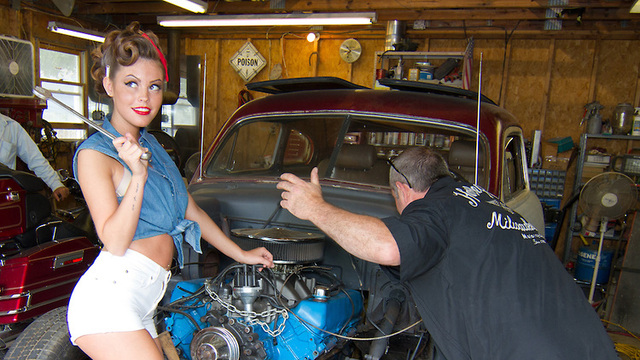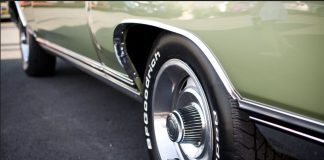The longer you do a thing, the more ways you figure out to do that thing. Sometimes, you figure out a way to do it better, or make it easier on yourself.
Like these:
* A three foot length of plastic (or metal) conduit tubing –
Next to duct tape, leverage is the mechanic’s best friend. And an easy way to increase it is by increasing the length of the lever you’re working with. A breaker bar is a specialized tool many mechanics have – but you can make your own (and for free or next to it) by cutting a length of conduit tubing (metal pipe works also) and slipping it over your ratchet handle.
What was hard to turn – like a really stubborn bolt – should now be easy.
The conduit tubing trick sometimes works even better than a breaker bar – unless you have a really long one. Douse the bolt you’re trying to break loose with a rust-penetrant such as PB-40 before you begin your efforts.
You can buy a length of conduit at any hardware store for about $10.
You can use this to increase the effective lifting range of a floor jack – and also to distribute the load as you raise the car, so that the weight o f the car isn’t all focused on the jack’s relatively small contact patch.
Using a wood block is particularly useful when working on old cars that have bolt-on front subframes that flex when you jack ’em up. A 4×4 block about 8-12 inches long (cut to fit your car) will reduce that, a lot. The block of wood will also not dent metal/chip paint (and undercoating), which is another plus, if you don’t like rust.
* An old syringe (big one) and length of clear tubing –
Use this to suck out various fluids that can’t be easily drained, such as the hydraulic fluid in a power steering reservoir or the brake fluid in a clutch slave cylinder. If you’re patient – and have a long enough length of clear plastic tube (buy this for a couple bucks at a Home Depot or Lowes; look in the plumbing department) you can also suck out the fluid from an automatic transmission, via the dipstick tube.
This latter can be very helpful if you accidentally over-fill the transmission – which is easy to do because (unlike engine oil) it is harder to drain all the fluid from an automatic (there is still some in the torque converter, also the cooling lines and so on) even if you dropped the pan. If you accidentally put in say a quart too much, it’s easier – much less messy – to suck out the excess than it is to drop the pan… again.
*Floor mats –
Carpeted floor mats make great “field expedient” bumper/paint protectors for when you need to haul some over-long object home that requires you to keep the trunk lid open.
Drape the mat over the lip of the trunk, carpeted side down, half inside the trunk, the other half covering the painted part of your bumper. Now lay whatever the object you meed to car home happens to be on top and secure the trunk lid with a bungee cord or piece of string or whatever else is handy. The mats are usually heavy enough to stay in place without having to tie them down.
You can also use the mats to protect interior surfaces of cars, such as seats and center consoles, etc. Flip them over (carpeted side down). The rubber side (which is often ribbed or similar, to hold the mat in place on the carpeted floor of the car) provides a good no-slip surface for whatever you’re carting home.
*Motorcycle chain lube –
Is just the ticket for protecting exposed bolts (and threads) that – at some point, you’ll need to loosen/remove again. Shock absorber bolts, for instance. If you coat them when they’re new, they’ll come right off when the shocks are old. 
I also use this stuff – it comes in an aerosol spray can – to cover prone-to-rust (and expensive to replace) parts located in areas that tend to get wet, underneath the truck. For example, the fuel pump/sending unit that Nissan (based on my experience with two Frontier pick-ups that have had the same problem) didn’t rust-protect very well from the factory. A couple of winters down the road and the tubing begins to Swiss Cheese and once there’s even a pinhole leak, there will be a gusher.
I learned – the hard way – to do some DIY rustproofing and have found that chain lube does a really good job. Wax works, too. Also, old motor oil (but that’s a mess). The chain lube is clear and doesn’t make a mess. It also lasts for a long time, unless physically disturbed.
If you have had it with control freak Clovers, Goo-guhl, diversity mongers and like contrarian, liberty-minded media, please consider supporting EPautos.
We depends on you to keep the wheels turning!
Our donate button is here.
If you prefer not to use PayPal, our mailing address is:
EPautos
721 Hummingbird Lane SE
Copper Hill, VA 24079
PS: EPautos stickers – new design, larger and magnetic! – are free to those who send in $10 or more to support the site.












Another handy shop tool I made is a good cross tie cut in half at an angle. Drive either end up on it and gain 6″ which for working on pickups is often all you need. One cross tie will make several chocks too. You can wrap them in flashing held down with screws and they work well for setting a trailer jack on. I often weld a small piece of a disc from a plow to the bottom of a trailer jack. You can move a heavy trailer a few inches this way and that easily when it’s covered in flashing. Take a couple pieces of thin metal, maybe some of that flashing folding in half so it’s 1/2″ wide and an inch or two long, stick one end of a knotted piece of rope under one on either side of those chocks and you always have a handle you can grab and easily move without having to actually get your hands under it to pick it up. Southern engineering.
One thing I’ve found can be used for a great many things is a home-made bar for tightening ratchet straps, the big 4″ jobs that have the ratchet on the trailer. It was one time easy to find an axle shaft, a tube that’s really high grade stuff and uber strong to which you can fill one end with a thick piece of steel with a hole in the center just large enough to accept that transmission in put shaft. The shaft is a good place for your hands if you’re using it as a cheater and of course, the tube is a great place for your hands if you’re using it to tighten straps. This is tubing much stronger than conduit or pipe and will take a licking and keep on it, Timex we call it. Not many axle tubes left these days but all sorts of stuff like that on industrial equipment(driveshaft). Search out a metal recycler and ask to look around. Sometimes machine shops have some great stuff in their pile and if you tell them exactly what you’re looking for they sometimes know just where the perfect thing is. You can sharpen the shaft end to be a wedge that can double for a lot of things. I have some roller shafts from an old mill that are solid 1 1/8″ and made from some sort of stainless that’s practically unbendable, unbreakable. They’re about 40″ long or so. If you can’t move something with one, slip one of those pipes like I just described over the last foot of it and double your torque. 2 3/8″ upset tubing is also good for big stuff. I have a piece 8′ long I use over a 36″ Ridgid pipe wrench to bully those huge nuts on the shaft of a big tandem disc plow. You can lift a lot of weight with one too. When you have that bad boy out you want to have your thinking cap on as well as some thick gloves. The finger you save may be your own and if it’s a two man thing, make sure you’re both on the same page. If you want to separate some difficult stuff use a chipping bar about 5′ long and somebody on the end with a sledge. Beat it enough times and it’s going to separate even if it’s welded.
Jack Handle usually works well as super long handle for extra torque. And usually right there and free!!!